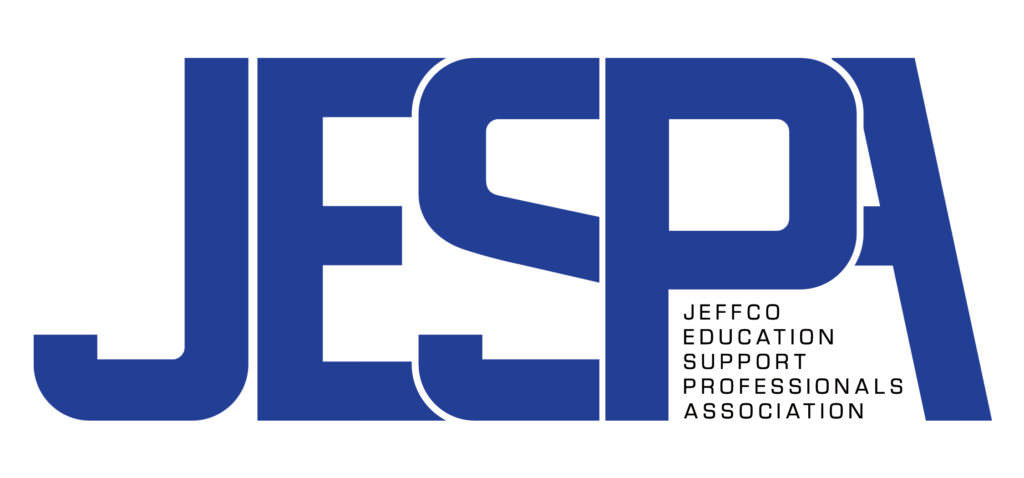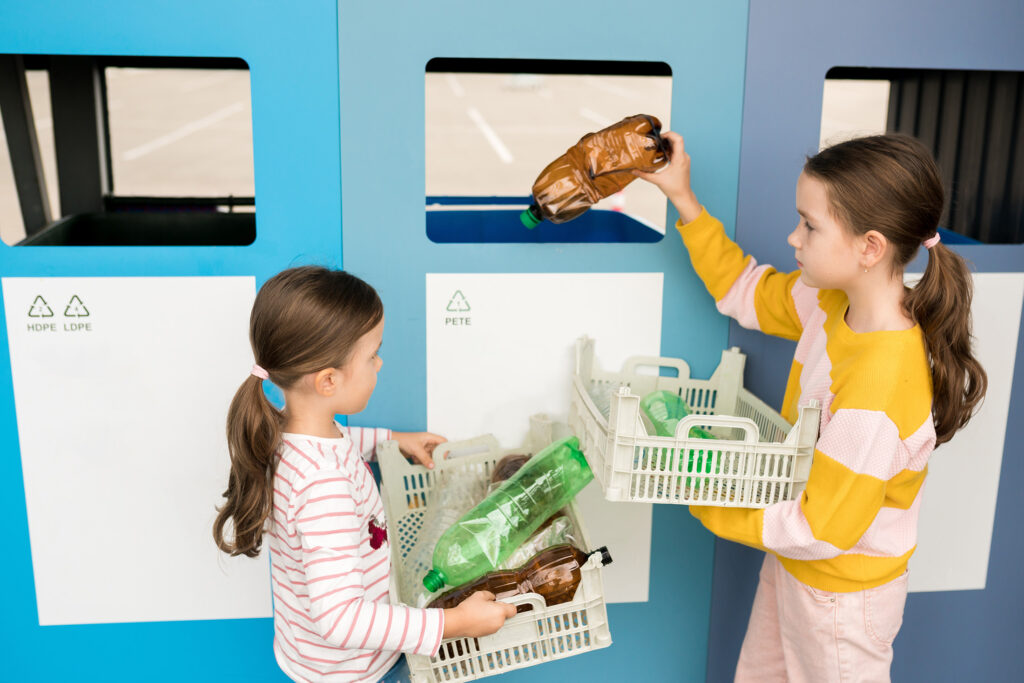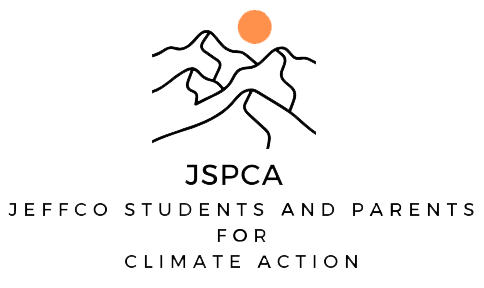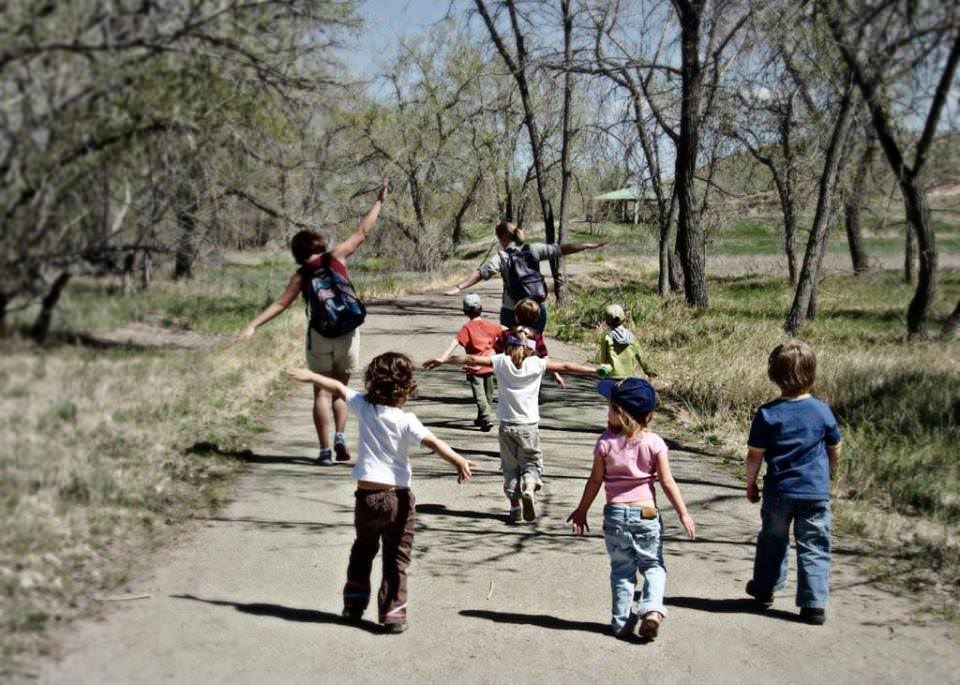






Take Action to Urge Jeffco Public Schools to Adopt a Climate Action Plan and ensure a healthy climate for our children and future generations!
Have you ever wondered:

Who We Are
JSPCA is a growing group of students, parents and community organizations who are urging Jeffco Public Schools (JPS) to adopt a plan to make schools more energy efficient, reduce waste, create healthier places for students to learn and save the district money that can be put back into the classroom.
The State of Colorado, Jefferson County and municipalities across the district have adopted plans to reduce their carbon footprint. As the second largest school district in the state, we believe it’s time that Jeffco Public Schools prioritize measures to protect the planet for the kids they serve and future generations.
Thanks to a large chorus of students and parents urging the District to take action on sustainability, Jeffco Public Schools has taken some solid steps forward. We are especially excited that Jeffco has created a Sustainability Manager position, which we feel is a major first step. JSPCA thanks the Jeffco Board of Education and Superintendent Dorland for moving the District towards sustainability. There is still more work to be done, and we look forward to continuing this work towards a climate policy passed by the School Board, creating a task force to determine how to reach those goals and setting clean energy and carbon reduction goals to match those at the County and State level.
Why a Climate Action Plan in Jeffco Public Schools?
Sustainability Means Cost Savings
Jeffco is one of the few school districts in the metro area without clear environmental sustainability initiatives, putting the district behind others in the state who are already benefiting from energy savings and waste reduction.
Federal and state programs have billions of dollars available for helping us transition to clean energy. We should take advantage of these opportunities at a time when budgets are tightening.
SUSTAINABILITY MEANS SAVINGS
Jeffco is one of the few school districts in the metro area without clear environmental sustainability initiatives, putting the district behind others in the state who are already benefiting from energy savings and waste reduction.
The Inflation Reduction Act, the Bipartisan Infrastructure Act, and state programs have billions of dollars available for helping us transition to clean energy. These funding opportunities available to Jeffco Schools to invest in green solutions would save resources and money in the long-term future of JPS. We should take advantage of these opportunities at a time when budgets are tightening.
Many other school districts in Colorado have a climate action plan or clear environmental sustainability initiatives, including Denver, Douglas, Colorado Springs D-11, Cherry Creek, Adams 12, St. Vrain, Boulder and more. Check out some of those districts’ cost savings from energy efficiency, waste reduction and fleet electrification:
- $5,636,237 Avg Annual Avoided Costs due to Sustainability Measures. (DPS Climate Action Plan for 2023)
- DPS is one of 13 Colorado districts and charter schools that will add electric school buses to their fleets through $24 million in state and federal funding, leading to cleaner air and cost savings for schools.
- 5-Year Goal: Ensure landfill diversion rate is at least 25%. Est 17% of waste diverted (in 2 yrs).
- 12% reduction in building energy use intensity from a 2013 baseline in 2017 and realized over $1 million in cumulative cost avoidance in those four years.
- Well situated to meet the district goal to achieve 20 percent reduction in consumption by 2023.
- Launched an infrastructure and energy-saving initiative in April 2023 to cut carbon emissions and redirect millions of dollars back to the classroom.
- Expected to reduce annual carbon emissions by 25%, water usage by 1.8 billion gallons and provide net savings to the school district of $20 million, over the next 20 years.
Boulder Valley School District:
- BVSD’s current waste diversion rate of 35% bests the statewide average. It is striving to reduce GHG emissions by 80% and become climate neutral by 2050. BVSD has 6 electric buses, with a goal to reduce local transportation emissions by 25% by 2026.
Read more about Sustainability initiatives and cost savings at other school districts in Colorado:
Jeffco Schools should take advantage of state and federal funding opportunities to invest in green solutions that would save resources and money in the long-term future of JPS – as many other school districts in the state are doing.
A School’s Environment Directly Impacts Learning
Ensuring our schools are healthy places to learn is critical for the educational success of students. Comfortable room temperature, clean air and clean drinking water all impact performance, attendance and concentration of both students and staff.
In addition, students’ mental health is suffering. 75% of youth are frightened about their future due to the climate crisis.
STUDENT IMPACTS
Ensuring our schools are healthy places to learn is critical for the educational success of students. Comfortable room temperature, clean air and clean drinking water all impact performance, attendance and concentration of both students and staff. In addition, students’ mental health is suffering. 75% of youth are frightened about their future due to the climate crisis, and 45% said their feelings about climate change negatively affect their daily life and functioning, according to a global study.
Children represent a particularly vulnerable group because greenhouse gasses emitted into the atmosphere will continue to accumulate over the coming decades and will profoundly impact our current students throughout their lives, as well as the lives of future generations. No one will suffer the consequences of the current climate crisis more than our kids, and their kids.
- Children are not only physically more vulnerable to the direct effects of extreme heat, drought and natural disasters, but climate change’s indirect effects can also derail children’s developmental trajectories and cause negative psychological impacts, according to a report by Princeton and the Brookings Institution.
- Heatwaves will affect almost every child on earth by 2050, according to data from the United Nations Children’s Fund (UNICEF). “The climate crisis is a child rights crisis – and it is already taking a devastating toll on children’s lives and futures,” warned UNICEF Executive Director.
In Colorado, we hear regularly about how climate change can have a profound impact on kids’ mental health and well being.
Colorado students say they want more solutions-oriented climate education now before it’s too late. Preparing students for the future, creating healthy learning environments, and teaching them to be thoughtful stewards of the Earth’s resources can help them obtain the knowledge necessary to become contributing adults and play a role in advancing a more sustainable and equitable environment.
Schools Have a Large Impact on Climate Change
The Jeffco School District includes 155+ schools and 90,000+ students and employees combined – contributing to large amounts of building emissions, transportation emissions and both organic and materials waste. Jeffco Schools should create climate goals to improve its recycling infrastructure, transition to electric vehicles, and improve energy efficiency.
ENVIRONMENTAL IMPACTS
With 155+ schools, 12 million sq ft of enclosed building space, over 3100 acres of land, and 90,000+ students and employees combined in the Jeffco Schools District, its environmental impact and carbon footprint is one of the largest in the state. Jeffco Schools has the opportunity to create climate goals that align with the Jefferson County Climate Action Plan, the Colorado Climate Action Plan and municipalities across the district. With the urgency of climate change, Jeffco Schools should consider its responsibility to participate in climate solutions. It can start by:
Creating a system-wide infrastructure for recycling, composting and waste diversion
- A 2019 World Wildlife Fund study found school districts waste 530,000 tons of food a year, accounting for nearly 2 million metric tons of carbon dioxide. With the addition of free lunches in the district, even more uneaten food is ending up in landfills and emitting methane, a potent greenhouse gas that contributes to climate change.
- There are opportunities to divert the waste such as a system-wide recycling infrastructure, and composting programs. Schools can also reduce food waste by diverting surplus food through share tables or food donation programs. Jeffco Schools can apply for funding opportunities and technical assistance through programs like Front Range Waste Diversion.
Transitioning to electric vehicles
- Jeffco Schools owns and operates a large fleet of both diesel and propane buses, along with other school district vehicles for school business, contributing to the polluted air. In addition, children exposed to diesel pollution puts them at increased risk for health conditions like lung and heart disease, asthma, cancer and other health issues.
- The American Lung Association studies the air quality across the country using data from air quality monitors and gives counties a grade much like our kids get on their report cards. Jefferson County received an F for air quality. We’re failing.
- Jeffco Schools can gradually convert district fleets and other equipment that runs on gasoline or diesel to electric powered alternatives. There are resources available through EPA Clean School Bus rebates/grants, Colorado Electric School Bus Grant Program, Colorado Clean Fleet Vehicle & Technology Grant Program, and other opportunities.
Improving energy efficiency
- K–12 schools are among the largest consumers of energy in the public sector and nationwide spend an estimated $8 billion annually on energy costs – equivalent to the output of more than 8 million homes. Nationwide, energy costs are the second-largest costs for school districts, second only to salaries. Reducing schools’ environmental impacts through energy efficiency, clean energy, energy education, and sustainable infrastructure has environmental, financial, and health benefits. (Aspen Institute)
- Jeffco Schools can establish targets for reducing energy use and transitioning to clean energy. It can and should work with the Jefferson County Sustainability Commission, local municipalities and the state to develop a climate action plan and to receive support in mitigating its environmental footprint and implementing programs to adapt and build resilience in preparing for potential local climate impacts.
- As an example, Aurora Public Schools joined the U.S. Department of Energy’s Better Buildings Challenge in 2014 and is on target to reduce energy use by 20% over a 10-year period, and the district’s portfolio water intensity is also expected to be 20% lower than its baseline year.
We believe that JPS should be taking advantage of state and federal opportunities to reduce its carbon footprint and transition to more sustainable operations.
Take action to Urge Jeffco Public Schools to Adopt a Climate Action Plan and ensure a healthy climate for our children and future generations!
Does your school environmental club, organization or business want to help?
We’re All In This Together

Jeffco Public Schools can join with existing local efforts to reduce its climate impact. Municipalities within the district, Jefferson County and the State of Colorado are all working towards becoming more sustainable. JSPCA believes that we can all work together to help ensure that students will thrive in a safe and healthy environment.
JSPCA would like to see Jeffco Public Schools:
- Set goals to reduce overall greenhouse gas emissions by at least 73% of the levels of district-wide greenhouse gas emissions that existed in 2015 by 2035, in line with the Jefferson County Climate Action Plan.
- Use 100% clean electricity by 2040 in alignment with the State of Colorado’s Roadmap to 100% Renewable Electricity by 2040 Plan and related policies.
- Reduce climate risk for all people, with priority to those experiencing the greatest disparities, by prioritizing sustainability actions in schools and communities facing greater inequity and/or environmental injustice.
- Create a Sustainability Task Force, led by the Sustainability Manager, to include community members, students, energy experts, partners, and district staff to develop a sustainability plan to be presented to the Board that addresses the following areas:
- Actively engage students in creating a culture of sustainability across the district with opportunities to work in the broader community and developing career preparation programs to enable students to enter into the green economy.
- Gradually convert district fleets and other equipment that runs on gasoline or diesel to electric powered alternatives.
- Ensure that new schools and district buildings are built and refurbished using LEED standards for environmentally sound building materials that promote efficient use of energy, water, and other resources.
- Reduce food waste and prepare low-carbon, environmentally-conscious meals while using reusable or compostable food service ware.
- Develop a sustainable framework that covers the purchase of office supplies, appliances, cafeteria supplies, and all other materials and equipment.
- Minimize or eliminate the use of hazardous pesticides and herbicides on JPS property and minimize disturbance of natural spaces to improve the resilience of ecosystems in Jefferson County to better withstand climate change impacts and eliminate the risk that pesticides/herbicides pose to our children’s health.
PARTNERS IN SUSTAINABILITY
Jeffco Students & Parents for Climate Action (JSPCA) wants to partner with the school district, community members, and experts in climate technology to support plans and action to address climate change – and to create a sustainable future for our youth.
Per Jeffco Schools District policy: “Environmental issues and attitudes constitute a vital part of the educational setting and will impact the present and future welfare of the students, District personnel, and the community as a whole. To that purpose, the Board directs that reasonable means be developed by the District, its students and personnel, to conserve natural resources, to recycle to the largest extent possible and practical, and to promote educational efforts that will encourage an environmental ethic. Students, District personnel, and the community should provide the vision, initiative, resourcefulness, leadership, and concern to make this policy workable and satisfying.” (Jeffco Policies, SectionE: Support Services, Title: Commitment to Conservation and the Environment, Code: EBABA)
The Colorado Association of School Boards (CASB) supports school boards placing a high priority on reducing carbon consumption in making decisions regarding capital improvement, energy use, and transportation; and supporting climate change and environmental education. CASB also urges the Colorado General Assembly and federal government to take swift and effective action on climate change to protect current and future students. (Resolution #50 – Climate Change Action, https://schoolsforclimateaction.weebly.com/uploads/1/0/9/2/109230709/ehr3fflwoaa9883.jpg )
Please join us in urging Jeffco Public Schools to Adopt a Climate Action Plan and ensure a healthy climate for our children and future generations!
- Sign the petition to urge the Jeffco School Board and Superintendent Dorland to support passage of a Climate Action Plan!
- Does your school environmental club, organization or business want to help? Please fill out this form to let us know how you’d like to be involved!
The District can be a leader within the community in sustainable resource use and the fight against the climate crisis and environmental and climate injustice, with the best available science to guide its policies.
Please Join Our Effort!
The District needs to hear from students, parents and community members that this is an urgent issue for them to address. Sign the petition today to lend your voice!
Have questions or want to get more involved? Email us here: [email protected]





